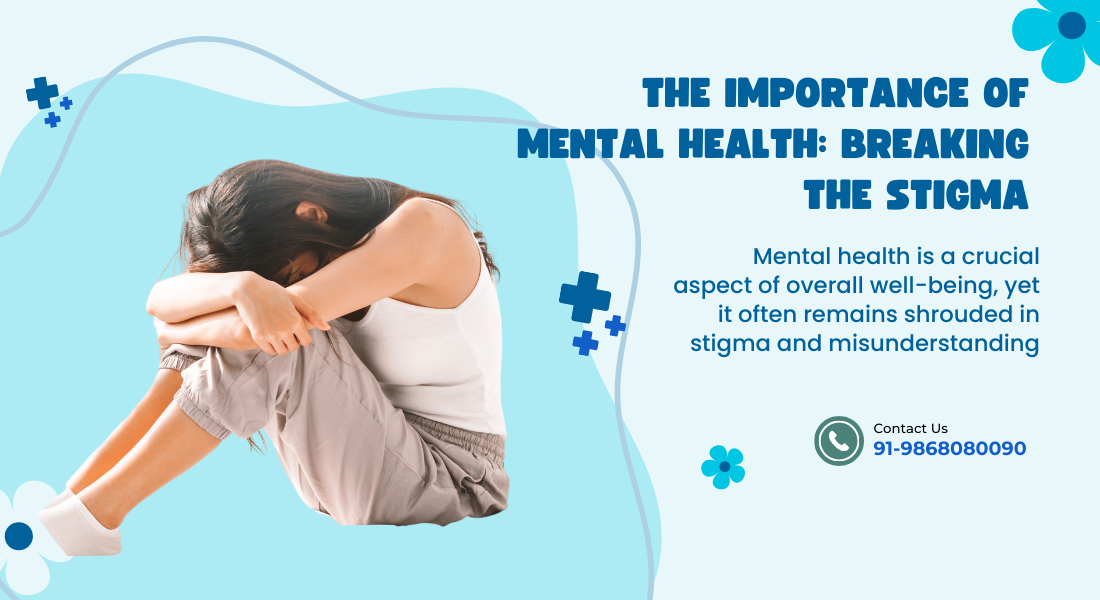Mental health is a crucial aspect of overall well-being, yet it often remains shrouded in stigma and misunderstanding. The societal attitudes surrounding mental health can prevent individuals from seeking help, sharing their experiences, and advocating for necessary changes. This blog post aims to highlight the importance of mental health and the need to break the stigma associated with it.
Understanding Mental Health
Mental health encompasses emotional, psychological, and social well-being. It affects how we think, feel, and act and plays a significant role in how we handle stress, relate to others, and make choices. Just like physical health, mental health is vital for living a fulfilling and balanced life.
The Prevalence of Mental Health Issues
Mental health issues are more common than many people realize. According to the World Health Organization (WHO), approximately one in four individuals will experience a mental health disorder at some point in their lives. Conditions such as anxiety, depression, bipolar disorder, and schizophrenia can affect anyone, regardless of age, gender, or background.
Why Mental Health Matters
- Overall Well-being: Good mental health is essential for leading a fulfilling life. It contributes to better physical health, improved relationships, and increased productivity.
- Resilience: Maintaining mental health helps individuals cope with life’s challenges. Those with strong mental health are more resilient and better equipped to handle stress and adversity.
- Quality of Life: Mental health significantly influences quality of life. Individuals struggling with mental health issues may experience difficulties in personal, professional, and social aspects of their lives.
- Economic Impact: Mental health disorders can have a substantial economic burden on individuals and society. The cost of lost productivity, healthcare, and social services related to mental health issues is significant.
Breaking the Stigma
Stigma surrounding mental health is a major barrier to seeking help. It can lead to feelings of shame, isolation, and fear. Here are some ways to break the stigma:
- Education and Awareness: Increasing awareness about mental health conditions and their prevalence can help dispel myths and misconceptions. Education fosters understanding and compassion, making it easier for individuals to discuss their struggles.
- Open Conversations: Encouraging open dialogue about mental health can normalize the topic. Sharing personal experiences and stories can help others feel less alone and more willing to seek help.
- Supportive Environments: Creating supportive environments in schools, workplaces, and communities is crucial. Organizations can promote mental health awareness, provide resources, and foster a culture of acceptance and understanding.
- Advocacy: Advocating for mental health policies and resources can lead to systemic changes that improve access to care and support. Support groups, campaigns, and mental health organizations can play an essential role in this effort.
- Leading by Example: Public figures and influencers speaking openly about their mental health struggles can inspire others to do the same. When leaders share their stories, it encourages broader acceptance and understanding.
Seeking Help
If you or someone you know is struggling with mental health issues, it’s important to seek help. Here are some steps to take:
- Reach Out: Talk to a trusted friend or family member about your feelings. Sometimes, just sharing can provide relief.
- Consult a Professional: A mental health professional can provide guidance, support, and treatment options tailored to individual needs.
- Utilize Resources: Many organizations offer hotlines, support groups, and online resources for those struggling with mental health issues.
Conclusion
Mental health is an essential component of overall well-being, and breaking the stigma surrounding it is crucial for fostering a healthier society. By promoting understanding, encouraging open conversations, and advocating for mental health resources, we can create an environment where individuals feel empowered to seek help and support. Remember, prioritizing mental health is not a sign of weakness but a testament to strength and resilience. Together, we can work towards a future where mental health is valued and respected, allowing everyone to lead fulfilling lives.



